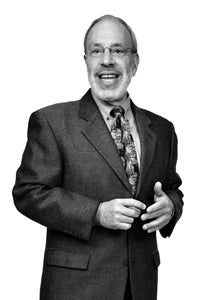Steven Goldberg ’72 is part of the legal team challenging the National Security Agency’s warrantless wireless wiretap of an Islamic charity in southern Oregon. He visited Harvard Law School on March 31 to discuss the case in the context of how law students and lawyers working apart from large organizations can get involved in similar cases.
The case involves an Oregon-based charity called Al-Haramain, which was founded to provide Korans to inmates in the state’s prisons. Al-Haramain was partially funded by a Saudi Arabian charity, some of whose funds were channeled through the Oregon branch to support struggles in Chechnya. The U.S. government designated Al-Haramain a terrorist organization in 2004. Al-Haramain challenged that designation and during the discovery stage of the designation case the government provided it with documents, including one that had been marked top secret.
At the time, the government’s warrantless wiretapping had not yet become public. “The lawyers assumed it wasn’t top secret anymore, since it had been given to them. Nobody really understood what this document was, but it contained conversations and was clearly some sort of wiretap result,” Goldberg said.
In December 2005, The New York Times ran a story describing the surveillance program, and those who had seen the top-secret document suddenly understood what it was. That’s when Goldberg became involved. He worked with AL-Haramain to file a lawsuit under the Foreign Intelligence Surveillance Act (FISA) alleging that the information had been illegally obtained, as there had been no warrant issued.
The ACLU and other organizations filed cases that were dismissed for lack of standing, because they could not prove that they had been surveyed. Goldberg’s case was the only one brought by a party that had been surveyed under the program.
“What has surprised the government most about the case is that there are so many hotshots from the ACLU and others working on the issue, but the only case that is still going on is a group of what they probably think are podunk lawyers in Oregon,” Goldberg said.
The government has litigated the case so forcefully, he explained, because it gets to the very heart of presidential authority. Both the Bush and Obama administrations have been fearful of a court decision that would limit presidential authority, especially as it relates to intelligence work.
“This case in particular has created a quandary, because many of the people working on it, including Obama himself, have made statements before they were in office questioning the legality of the wiretap program,” he said. “So now they want to focus not on the legality of wiretapping, but on whether the president has the authority to order this kind of surveillance.”
Goldberg also discussed how young lawyers can get involved in such cases. A general practitioner in private practice, he explained that he came to work on the case as a result of work and he and other lawyers had done with the Muslim community. He reassured students that, although there are not many jobs at the ACLU and similar organizations, it is indeed possible to work on these types of cases. He advised students to build strong litigation skills, and to get involved in the political and community groups they’re interested in working with. He emphasized the impact that these cases have, especially at a time when the American people still perceive the country to be at risk, and when Congress has lost much of its willingness to keep presidential authority in check.
“It’s really important – and fun – to do these cases,” Goldberg said. “It’s really important to talk to the public and to let people know generally what these legal issues are all about so they can understand and keep some check on what is going on in Congress. Congress needs to know that people care about these issues.”
